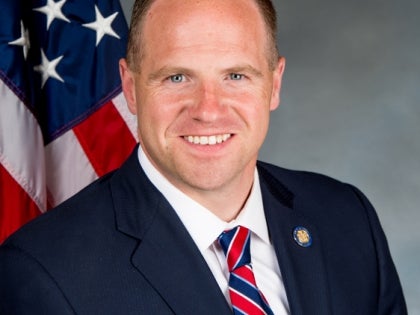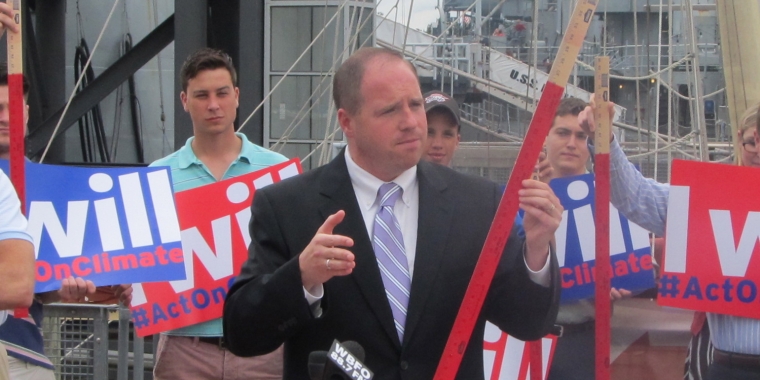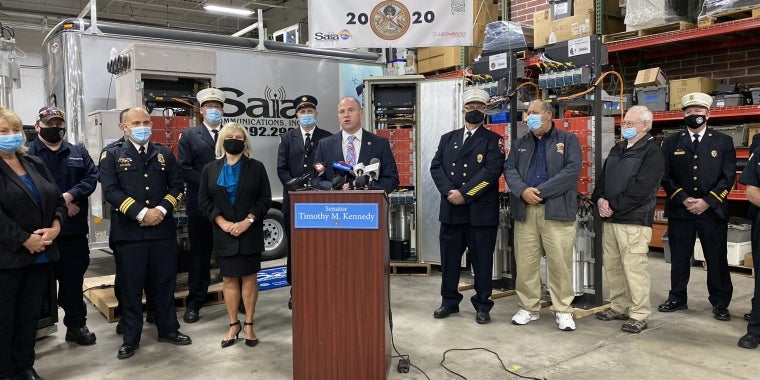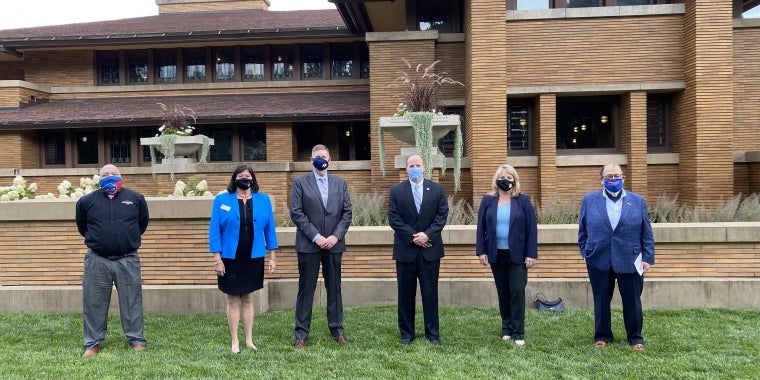
Kennedy, Higgins Address Damaging Impact of Climate Change on Buffalo Waterfront and Great Lakes Ecosystem
Timothy M. Kennedy
July 30, 2013

Canalside event highlights importance of President Obama’s call for climate action
BUFFALO, NY – Today, New York State Senator Timothy M. Kennedy, U.S. Rep. Brian Higgins, BFLO Harbor Kayak Founder and Owner Jason Schwinger, and several other waterfront enthusiasts gathered for a press event on the Central Wharf at Canalside to highlight the severe impacts of extreme weather and climate change on the Great Lakes and New York’s many inland waterways. Today’s press event comes on the heels of President Barack Obama’s historic action on climate change.
“The repercussions of climate change are very real, and I believe the President is showing true leadership in addressing this issue head-on and calling on America to take a stand against excessive carbon emissions and pollution,” said New York State Senator Timothy M. Kennedy. “This is not only about the environment, it’s also about our economy, especially for Western New York as we finally embrace our waterfront development destiny and see progress and new activities spring-up on the Lake Erie and Buffalo River shorelines almost every day.”
“The negative effects of climate change would have a devastating impact on our Great Lakes, both environmentally and economically,” said U.S. Congressman Brian Higgins, a member of the bipartisan Great Lakes Task Force. “The best way to ensure that Western New Yorkers maintain the accessibility of the water’s edge for commerce and recreation is to stand with President Obama on the issue of reducing carbon emissions, while also fully funding programs like the Great Lakes Restoration Initiative, which are actively working to preserve and protect our Great Lakes.”
According to Kennedy, Higgins, and other participants, President Obama has presented a broad, common-sense plan for meeting our obligation to protect future generations from climate change. Industrial carbon pollution was just measured at the highest levels in human history. And in Western New York especially, the effects of excessive industrial pollution on local populations and natural resources is well known.
“We simply cannot sit idly by and let this threat to Lake Erie and the Great Lakes ecosystem go unchecked,” continued State Senator Kennedy. “Directing the EPA to set power plant carbon pollution standards is the strongest possible action President Obama can take to address the impacts of climate change.”
Various studies have chronicled the effects of climate change on the health of the Great Lakes. Some of the key findings include:
- Warming waters and early-season rains associated with climate change have led to record-setting toxic algae blooms across much of Lake Erie. (NYT-March 2013)
- Such algae blooms are creating “dead zones” within the lake, sometimes encompassing more than 1/3 of the entire lake bottom. (NYT-March 2013)
- The Lake Erie western basin has seen a 40 percent reduction in charter angling operations, as a result of bloom activity, growth, and impact on oxygen levels, resulting in decreasing fish counts. (NYT-March 2013)
- Reduced winter ice coverage on the Great Lakes due to warmer waters and climate is leading to increases in lake effect snow episodes and early-season precipitation. (Great Lakes Integrated Sciences and Assessments Center, Universities of Michigan and Michigan State, Climate Change in the Great Lakes, 11/15/12)
- Lake levels are now at historic lows, 26 inches below their long-term averages. (AP-March 2013)
To highlight the drop in lake levels, Kennedy held up a yardstick demonstrating the dramatic decline. He further explained that according to the Lake Carriers’ Association, for every inch of water that the lakes lose, the ships that carry materials across the Great Lakes must lighten their loads by 270 tons — or 540,000 pounds. Otherwise, these ships risk running aground
“Climate change is having a profound impact on the Great Lakes, especially Lake Erie,” concluded NYS Senator Kennedy. “It is not only an environmental concern, it is also economic. Our region has many small and medium sized employers that—in order to stay in business and add to the quality of life and attractiveness of Buffalo Niagara—rely on a healthy and thriving Lake Erie. Be it restaurants, charter fishermen, recreational watersports, or the many other waterfront features our area offers.”
Current polls show that a majority of Americans want climate action now. Sixty-five percent of voters support “the President taking significant steps to address climate change now” (Benenson Strategy Group for League of Conservation Voters, 2/12/13).
###



